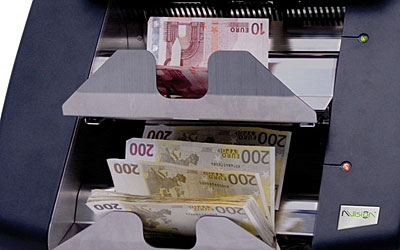Amazon recommendation: The Art of Currency Trading: A Professional's Guide to the Foreign Exchange Market (paid link)

A new banknote counter and fitness sorter from De La Rue Cash Systems is designed to meet the new requirements of the Eurosystem and the European Central Bank (ECB) to be launched in May 2007.
The compact multi-currency machine with fitness sorting meets the ECB Recycling Framework's requirements. It performs simultaneous note detection and fitness sorting.
For high desktop productivity, the machine allows continuous and uninterrupted note processing.
Nvision has two full-stacking pockets with a remarkably smooth glide feed system. It is capable of multiple detection technologies thus providing outstanding productivity with a processing speed up to a thousand notes per minute.
Cash processing organizations are in search for affordable fitness solutions that ensure notes meet the pending requirement of the ECB banknote recycling mandate. With the product launch in May, De La Rue intends to address this demand.
Understanding the European Central Bank (ECB)
The European Central Bank (ECB) is a pivotal institution in the European Union, responsible for overseeing the monetary policy of the eurozone countries. Here are key aspects of the ECB:
- Role and Purpose: The primary role of the ECB is to maintain price stability in the eurozone, seeking to keep inflation under control. This is crucial for economic stability and growth within the member states.
- Monetary Policy Administration: The ECB administers the monetary policy for the eurozone, which includes setting key interest rates and controlling the money supply.
- Eurozone Management: The ECB is central to the management of the euro, the common currency used by 19 of the 27 EU member states.
- Banking Supervision: Alongside national authorities, the ECB also plays a significant role in the prudential supervision of credit institutions within the euro area, contributing to the safety and soundness of the banking system.
- International Presence: The ECB represents the eurozone in international monetary affairs, such as dealings with other central banks and financial institutions.
- Decision-Making Bodies: The key decision-making bodies of the ECB include the Governing Council, the Executive Board, and the General Council, each playing distinct roles in the bank's functioning.
As a central institution of the European Union, the ECB's decisions and policies have a significant impact not only on the eurozone's financial system but also on the global economy.